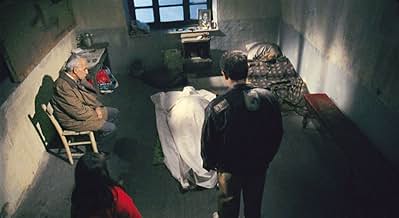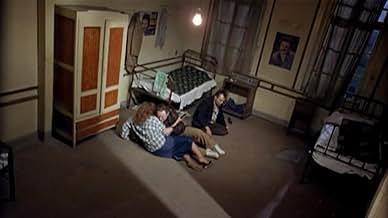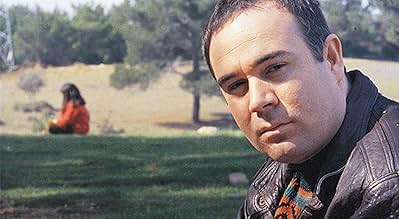IMDb RATING
8.1/10
21K
YOUR RATING
Yusuf is released from prison after serving a ten-year sentence. He is scared of life outside as he goes to an address given to him by another prisoner.Yusuf is released from prison after serving a ten-year sentence. He is scared of life outside as he goes to an address given to him by another prisoner.Yusuf is released from prison after serving a ten-year sentence. He is scared of life outside as he goes to an address given to him by another prisoner.
- Awards
- 20 wins & 2 nominations total
Yalcin Cakmak
- Cezaevi Müdürü
- (as Yalçin Çakmak)
- Director
- Writer
- All cast & crew
- Production, box office & more at IMDbPro
Featured reviews
Demirkubuz seems like being aware of the place of gates in life. We all open and close many doors throughout our lives. 'Masumiyet' begins with an appearance of the manager's gate and we see Guven Kirac who offers a satisfactory performance. And 'Kader' is closed with a half-open door where Bekir grasps that 'this is his destiny'. It is impossible for Bekir to close the door opened by Ugur on the day at the carpet store.
The audience may capture many details based on 'gates'. Now I want to talk about the spectacular preaching of Ugur with which she takes our breath for a while. At the motel room, Ugur warns Yusuf about the destiny waiting for him. But as Bekir does, Yusuf ignores this warning because he is already taken over by love.
See this movie, then 'Kader' (or the reverse if you like a chronological telling).
The audience may capture many details based on 'gates'. Now I want to talk about the spectacular preaching of Ugur with which she takes our breath for a while. At the motel room, Ugur warns Yusuf about the destiny waiting for him. But as Bekir does, Yusuf ignores this warning because he is already taken over by love.
See this movie, then 'Kader' (or the reverse if you like a chronological telling).
You can see and feel life throughout the film with the help of players. All three have their choices for life, which they can fight for. And their choices bring them together in a strange world. Absolutely a wonderful story about pure feelings and life.
All actors and acrtress are brillant. All scenes is so realistic. The scene planning and shooting angles show the emotion and stability very well. The film is both very static and progresses in a way that events can happen at any moment. The search adventure of the lead character with Disabled Girl could have been kept a little longer, but other than that, it is a Turkish masterpiece in every detail. You should definitely watch the same director's 'Destiny' movie right after this. I think it is the most impressive movie of the director who handles the sociology of the period very well and blends it with his art.
Set in the seedier areas of İzmir, Ankara, and İstanbul, MASUMİYET focuses on Yusuf (Güven Kıraç) who is released from prison after ten years but fears the outside world. Having been given the name of a suitable contact, he travels to İzmir to stay in a seedy hotel and encounters musician Bekir (Haluk Bilginer), Uğur (Derya Alabora), and her deaf-mute daughter Çilem (Melis Tuna). Yusuf becomes friendly with the family but by doing so becomes involved in a peripatetic existence fraught with danger that leads to death and disillusion.
Several of the themes characteristic of director Zeki Demirkubuz's work resurface here. There are several shots of darkened rooms, that are instantly filled with shafts of light at the center of the frame as doors are opened, and return to darkness once more as the doors are closed. Such shots metaphorically summarize the protagonists' lives as consisting of unremitting darkness penetrated by shafts of light. Yet they are only occasional; for the most part the characters are prisoners of their existences, as shown by the repeated use of metal or iron bars through which we view the characters, or which form a backdrop to individual scenes.
This hopelessness is contrasted with the idealized lives portrayed on the almost continuous Yeşilçam films from the Sixties and Seventies that are broadcast on the televisions in Yusuf's hotel and other public places. These broadcasts have an almost magical-like power to attract the guests' interest, to such an extent that the hotel owner (Doğan Turan) keeps encouraging Yusuf to set his troubles aside and watch television, a cup of tea in his hand. The televisual world is an uncomplicated one of good triumphing at evil's expense; where justice is meted out and the path of true love is clearly defined. Such moral absolutes prove a welcome respite from the stresses of daily life.
Yet Demirkubuz shows how fiction and "reality" can become confused, as Uğur's face appears on television as part of a news broadcast. Unable to separate the two, Çilem watches the screen with the same fascination as with the Yeşilçam melodramas. We understand, however, that television has the power to distort people's view of the world, even while providing some form of narcotic for viewers.
The characters live rootless lives, as symbolized by the repeated point of view shots showing public buses traveling along deserted roads, full of passengers, and only stopping occasionally for half- hour food breaks. Yusuf would like to achieve stability, but finds himself unable to do so; his sister will not even speak to him, while his brother-in-law (Ajlan Aktuü) has been rendered half-crazed by a sterile marriage. Hence Yusuf has to move on with Cilem in tow, first to Ankara and then to İstanbul.
Yet life isn't much better in either city. Yusuf has been given a name, but finds that the person concerned is not there, as he visits Ankara. He goes to a seedy disco (ironically called "The King's Disco"): grand it certainly ain't. Traveling on to İstanbul, he moves through Beyoğlu's netherworld of cramped streets and darkened, deserted houses, whose windows are almost invariably lined with iron bars.
There is no sense of resolution in MESUMİYET; as the epigraph (from Beckett's suggests), the characters always lose, however much they try. The only thing they can hope for is to become better losers.
Several of the themes characteristic of director Zeki Demirkubuz's work resurface here. There are several shots of darkened rooms, that are instantly filled with shafts of light at the center of the frame as doors are opened, and return to darkness once more as the doors are closed. Such shots metaphorically summarize the protagonists' lives as consisting of unremitting darkness penetrated by shafts of light. Yet they are only occasional; for the most part the characters are prisoners of their existences, as shown by the repeated use of metal or iron bars through which we view the characters, or which form a backdrop to individual scenes.
This hopelessness is contrasted with the idealized lives portrayed on the almost continuous Yeşilçam films from the Sixties and Seventies that are broadcast on the televisions in Yusuf's hotel and other public places. These broadcasts have an almost magical-like power to attract the guests' interest, to such an extent that the hotel owner (Doğan Turan) keeps encouraging Yusuf to set his troubles aside and watch television, a cup of tea in his hand. The televisual world is an uncomplicated one of good triumphing at evil's expense; where justice is meted out and the path of true love is clearly defined. Such moral absolutes prove a welcome respite from the stresses of daily life.
Yet Demirkubuz shows how fiction and "reality" can become confused, as Uğur's face appears on television as part of a news broadcast. Unable to separate the two, Çilem watches the screen with the same fascination as with the Yeşilçam melodramas. We understand, however, that television has the power to distort people's view of the world, even while providing some form of narcotic for viewers.
The characters live rootless lives, as symbolized by the repeated point of view shots showing public buses traveling along deserted roads, full of passengers, and only stopping occasionally for half- hour food breaks. Yusuf would like to achieve stability, but finds himself unable to do so; his sister will not even speak to him, while his brother-in-law (Ajlan Aktuü) has been rendered half-crazed by a sterile marriage. Hence Yusuf has to move on with Cilem in tow, first to Ankara and then to İstanbul.
Yet life isn't much better in either city. Yusuf has been given a name, but finds that the person concerned is not there, as he visits Ankara. He goes to a seedy disco (ironically called "The King's Disco"): grand it certainly ain't. Traveling on to İstanbul, he moves through Beyoğlu's netherworld of cramped streets and darkened, deserted houses, whose windows are almost invariably lined with iron bars.
There is no sense of resolution in MESUMİYET; as the epigraph (from Beckett's suggests), the characters always lose, however much they try. The only thing they can hope for is to become better losers.
Turkish filmmaker Zeki Demirkubuz exploded onto the international scene with this extraordinary sophomore feature which won him a legion of admirers, and detractors, across Turkey as well as top prizes at the Antalya Golden Orange and Adana Golden Boll International Film Festivals and inspired a prequel a decade on.
Güven Kiraç puts in a wonderfully nuanced performance as the painfully lost sole at the centre of this narrative with powerful support from Derya Alabora and Haluk Bilginer, who both won Golden Orange awards for their performances, and the young Melis Tuna who gives a pitch perfect debut performance.
The contemporary director has a curious fascination with the sort of characters so often sidelined by Turkish filmmakers eager to show their country at its best and this comes through in his use of language, somewhat lost in subtitle translation, and the carefully woven back-story, which inspired a prequel, that drive this compelling film forward.
Let's get out of this place.
Güven Kiraç puts in a wonderfully nuanced performance as the painfully lost sole at the centre of this narrative with powerful support from Derya Alabora and Haluk Bilginer, who both won Golden Orange awards for their performances, and the young Melis Tuna who gives a pitch perfect debut performance.
The contemporary director has a curious fascination with the sort of characters so often sidelined by Turkish filmmakers eager to show their country at its best and this comes through in his use of language, somewhat lost in subtitle translation, and the carefully woven back-story, which inspired a prequel, that drive this compelling film forward.
Let's get out of this place.
Did you know
- TriviaIn the film, being innocent is represented as being silent. The innocent do not have a voice. Both Yusuf's sister and nephew and Ugur's daughter do not talk at all. Yusuf begins very silent and after he became more involved in things, he starts talking more.
- ConnectionsFeatured in Yeralti (2012)
- How long is Innocence?Powered by Alexa
Details
- Runtime1 hour 50 minutes
- Color
Contribute to this page
Suggest an edit or add missing content





















